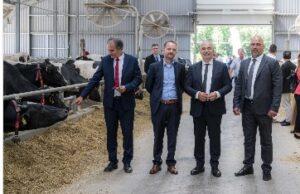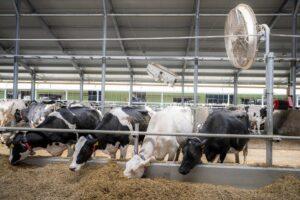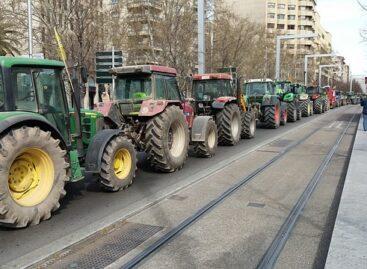The countryside is the key to the renewal and success of Hungary in the 21st century
As part of its commitment to improving Hungarian agriculture and the quality of life in rural areas, the Hungarian government continues to invest in the modernization of livestock farms. The countryside is the key to the renewal and success of Hungary in the 21st century – said Minister of Agriculture István Nagy at the investment handover ceremony of Milkmen Földesi Tejtermelő Kft., on Thursday in Földespusztán.

In order to maintain competitiveness in the cattle sector, high-tech livestock farms that comply with European Union regulations in all respects are necessary (Photo: AM/Csaba Pelsőczy)
The Minister emphasized that the application of Milkmen Földesi Tejtermelő Kft. fits into a well-thought-out development concept. The purpose of the investments was to utilize and increase the potential of livestock with outstanding genetics, even in the national context, thereby increasing the company’s effectiveness, setting an example of the region’s ability to renew itself and its possible future development directions. He added that the 480-seat production barn and service facility based on a robotic milking system was realized with a budget of around 4 billion forints and the use of support resources, which will be the basis of their animal husbandry activities in the future. The new investment is currently based on one of the most modern technologies in terms of domestic conditions and helps to take advantage of the genetic potential of livestock, which the company has developed in recent years in collaboration with universities, explained the minister.
István Nagy reminded that, compared to the EU, Hungarian livestock breeders and livestock keepers have the largest number of support titles available
Thanks to the 80 percent additional national funding, the opportunities that can be realized within the framework of the KAP Strategic Plan have increased considerably. The system of the Common Agricultural Policy until 2027 therefore not only represents expectations, but also opportunities due to the Hungarian attitude, he explained. The head of the ministry emphasized that numerous calls for tenders of the Rural Development Program have already provided support opportunities for livestock farms. There was and still is a demand for this in the cattle breeding sector, since in order to maintain competitiveness, livestock farms of a high technological standard that comply with the European Union regulations in all respects are necessary. One of the most important calls, entitled “Support for the development of livestock farms”, aimed at the modernization of facilities on a larger scale and could be used for the construction of buildings, the purchase of machines and tools, modernization aimed at reducing energy consumption, the application of technologies aimed at the use of renewable energy, and even new livestock farms also for complex formation. As part of the call, the Ministry of Agriculture supported 687 applications, worth a total of HUF 381.5 billion, István Nagy said.

(Photo: AM/Csaba Pelsőczy)
AM
Related news
Avian influenza has appeared in a new farm in Csongrád-Csanád County
🎧 Hallgasd a cikket: Lejátszás Szünet Folytatás Leállítás Nyelv: Auto…
Read more >UBM may continue its international expansion
🎧 Hallgasd a cikket: Lejátszás Szünet Folytatás Leállítás Nyelv: Auto…
Read more >Related news
Historic price reduction at ALDI
🎧 Hallgasd a cikket: Lejátszás Szünet Folytatás Leállítás Nyelv: Auto…
Read more >







